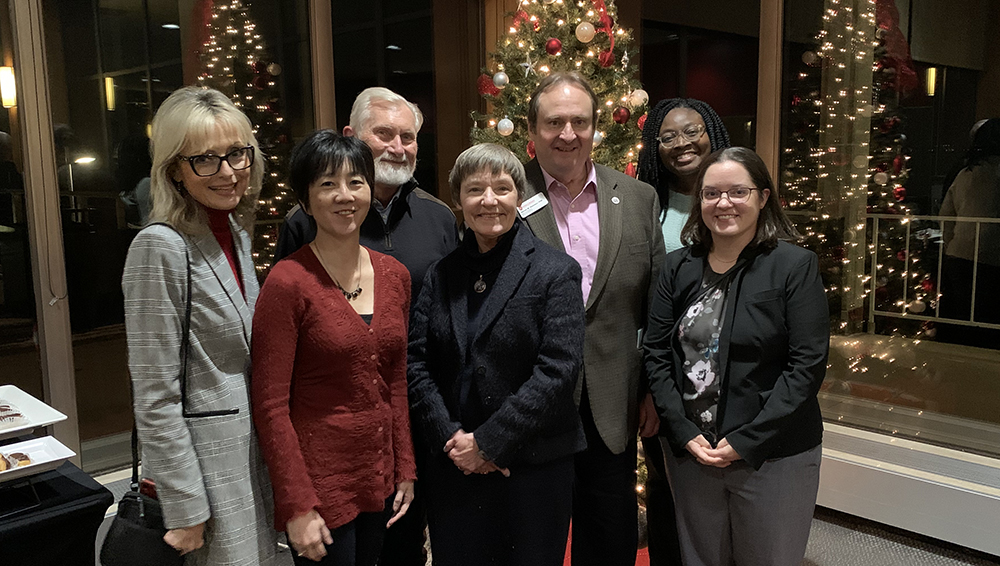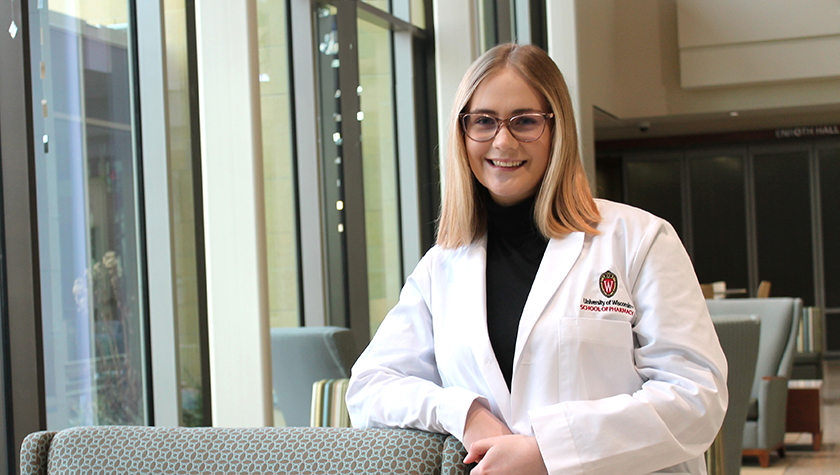Professor Michelle Chui leads a mentorship development program to support underrepresented scholars for a stronger, more inclusive workforce
By Katie Ginder-Vogel
Mentorship lies at the heart of Michelle Chui’s career. As a professor in the University of Wisconsin–Madison School of Pharmacy’s Social and Administrative Sciences Division, she regularly mentors graduate students in School’s Health Services Research in Pharmacy program, as well as the members of the Sonderegger Research Center for Improved Medication Outcomes, where she serves as director.
Through a new role at the UW Institute for Clinical and Translational Research, she has the opportunity to do just that on a broad scale. Chui has been named the co-director of ICTR’s Collaborative Center for Health Equity (CCHE).
“The side of CCHE I work on is focused on workforce development and training, in collaboration with other workforce development certification programs within ICTR, including Implementation Science and Community Health Outcomes, a certificate program within ICTR focused on community health,” says Chui. “It’s an exciting space, and it has been a happy surprise for me to enjoy it and find it so satisfying to make a difference for other people.”
“If we all think the same way, we can’t solve problems.”
—Michelle Chui
Through the new role, she will lead the CCHE’s Mentorship and Professional Development (MPD) program, which supports the careers of historically underrepresented scholars in biomedical sciences.
“If we all think the same way, we can’t solve problems,” says Chui. “A diverse workforce and group in academia enriches our communities and the collaborations that take place in academia.”
Building Up support
Chui’s new role at ICTR and the CCHE stems from her leadership with the Building Up project, a grant-funded, nationwide randomized control trial. UW–Madison was one of 25 sites nationally that participated in Building Up, which tested and evaluated an intervention to support underrepresented scholars, and Chui led the UW–Madison team.
In the study, half of the participating institutions, including UW–Madison, received the intervention — a near-peer mentoring program — while half did not. In traditional mentoring, a senior professional mentors a more junior professional, but a near-peer mentor hasn’t necessarily reached the pinnacle of their career yet.
“A ‘near peer’ is close enough in experience to the scholars they mentor that they can anticipate their roadblocks and better connect them with the right people and answer questions,” says Chui.

Olayinka Shiyanbola, associate professor in the School’s Social and Administrative Sciences Division, volunteered to be a near-peer mentor as part of the intervention.
“I wanted to get involved in the Building Up project because I knew how important support and mentoring played a role in my own career trajectory,” says Shiyanbola. “I was excited to be part of the group providing an opportunity for underrepresented early career faculty to receive similar support and mentoring. The experience provided the opportunity for me and the scholars to learn from each other.”
Many underrepresented scholars — which include racial minorities, first-generation, lower socioeconomic, LGBTQ+, and disabled students — may not anticipate potential roadblocks or know how to tackle them, explains Chui.
She and her colleagues identified underrepresented scholars through ICTR connections, recruited near-peer mentors like Shiyanbola, who developed workshops in various topics to support their growth. The small cohort of six Building Up scholars from different areas of campus were able to support each other.
Chui’s leadership of Building Up resulted from her role co-directing ICTR’s TL1 program, a National Institutes of Health (NIH)-funded program that supports promising graduate students and postdoctoral scholars. Another NIH program, KL2, supports junior faculty.
“The challenge is to not leave people behind,” says Chui. “I came on board to advocate for underrepresented researchers and health equity initiatives in ICTR’s workforce development. My becoming the site leader for Building Up just made sense.”
Paths to success
The Building Up program made it clear that underrepresented scholars need unique support from their mentors. Compared with scholars with college-educated parents and financial privileges that allowed them to have a home computer in high school, avoid incurring undergraduate debt, or go directly to pharmacy school and graduate school, many underrepresented scholars are working to put themselves through school, caring for family members, and otherwise juggling competing responsibilities throughout their graduate studies.
“Underrepresented people bring something different to the table: an authentic engagement with their own communities,” Chui says. “A lot of our scholars are doing work as underrepresented individuals in the health equity space. That’s why they are in academia. They want to lift up the communities they come from.”
“In this role, I support scholars from pharmacy, medicine, veterinary medicine, nursing, education, and engineering — we’re all together, trying to improve human health.”
—Michelle Chui
To continue to meet these students’ needs, ICTR decided to create its own ongoing version of the Building Up program and “UW-ify it,” as Chui says, to make it work for both ICTR and UW–Madison.
“We wrote a grant to the Wisconsin Partnership Program (WPP) through ICTR, and they funded this entire crazy idea of ours,” says Chui. “The goal is to support underrepresented scholars during each step of their career pathway.”
The MPD already supported the careers of historically underrepresented scholars in biomedical sciences via two pathway programs: AHEAD (Advancing Health Equity and Diversity) for postdoctoral trainees, and ADEPT (Advancing Diversity and Equity in Pre-Doctoral Trainees) for part-time graduate students, which is led by Chui.

“There is a silent, invisible cohort of grad students who may be coming to academia as a second career or were trained as clinicians and want to fix things at a higher level,” says Chui. “Others have come to academia non-traditionally — maybe they did community college, worked full-time, are caring for family, or finished their undergraduate degrees part-time at a four-year college. These students have deep, meaningful lived experiences that inform the research they want to do and the change they want to make.”
The Building Up program highlighted the need for a third to reach young faculty: STRIDE (Success Together Reaching Independence, Diversity, and Empowerment). Shiyanbola, inspired by her time as a near-peer, leads the STRIDE program.
“There are limited opportunities for underrepresented faculty to learn and share about topics that will help them gain career independence, especially with others who share the same lived experiences,” says Shiyanbola. “STRIDE provides this space, while providing mentoring, support, and guidance. I am excited to see the careers of early career faculty who are underrepresented in clinical and translational research grow.”
STRIDE was initially funded to support eight faculty members for one year and provided workshops and skills training to help them get on their feet and start applying for grant funding. Additional WPP funding for a second year of STRIDE has allowed 11 faculty to participate in a more flexible program, designed to meet junior faculty where they are. For example, everyone needs support for writing grants, but everyone writes them at different times. With the increased flexibility, scholars can find the help they need when they need it.
“There’s a clear need for this program,” says Chui. “Many STRIDE faculty are family caregivers and have complicated lives. We wanted to acknowledge and honor that fact and give them autonomy and agency to let us know what will help them in the near term.”
Growing impact
They’re disseminating their findings from Building Up and are beginning to see other R1 institutions — which have very high research activity — developing similar programs.
“I’m really proud of this program because we uncovered something that we didn’t know existed. There’s so much potential, and we’re very grateful to WPP for partnering with us on this initiative,” says Chui. “We can build up and support underrepresented scholars and train them to become mentors to the next generation of underrepresented scholars — a critical mass to start momentum.”
“I’m really proud of this program because we uncovered something that we didn’t know existed.”
—Michelle Chui
Chui began her new role in January and has been ADEPT director for about a year and a half and TL1 co-director for several years. Chui appreciates the fact that ICTR is truly interdisciplinary.
“In this role, I support scholars from pharmacy, medicine, veterinary medicine, nursing, education, and engineering — we’re all together, trying to improve human health,” Chui says. “It’s not just clinical work or drug work; it’s lots of different approaches. I love feeling like I’m doing something for scholars, and this is really great for me, too.”

